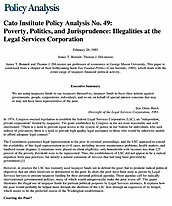Poverty, Politics, and Jurisprudence: Illegalities at the Legal Services Corporation
We are using taxpayers funds to sue taxpayers themselves, taxpayer funds to have class actions against governments, people, corporations, individuals, and so on, on behalf of special interest concerns that may or may not have been representative of the poor.
Sen. Orrin Hatch
Oversight of the Legal Services Corporation, 1983.
In 1974, Congress enacted legislation to establish the federal Legal Services Corporation (LSC), an “independent, private corporation” funded by taxpayers. The goals established by Congress in the act were reasonable and well intentioned: “There is a need to provide equal access to the system of justice in our Nation for individuals who seek redress of grievances; there is a need to provide high quality legal assistance to those who would be otherwise unable to afford adequate legal counsel.”
The Constitution guarantees legal representation to the poor in criminal proceedings, and the LSC appeared to extend the availability of this legal representation to civil cases, including income maintenance problems, health matters, and landlord-tenant disputes. Limitations were placed on client eligibility: only households with incomes less than 125 percent of the poverty threshold were to be represented. Thus, the establishment of LSC did not appear to be a radical departure from past practices, but merely a natural extension of services that had long been provided by government.[1]
However, in practice the LSC has routinely used taxpayer funds not to defend the poor, but to promote radical political objectives that are often irrelevant or detrimental to the poor. In short, the poor have been used as pawns by Legal Services lawyers to procure taxpayer funding for their personal political agendas. These agendas call for radically interventionist governmental policies, many of which would unequivocally make the poor worse off. This paper illustrates the illegal use of taxpayer funds for partisan political purposes by Legal Services attorneys. It explains how the poor would probably be helped more through the abolition of the LSC than through an expansion of its budget, which seems to be the preferred course of the Washington establishment.
About the Authors

This work is licensed under a Creative Commons Attribution-NonCommercial-ShareAlike 4.0 International License.
